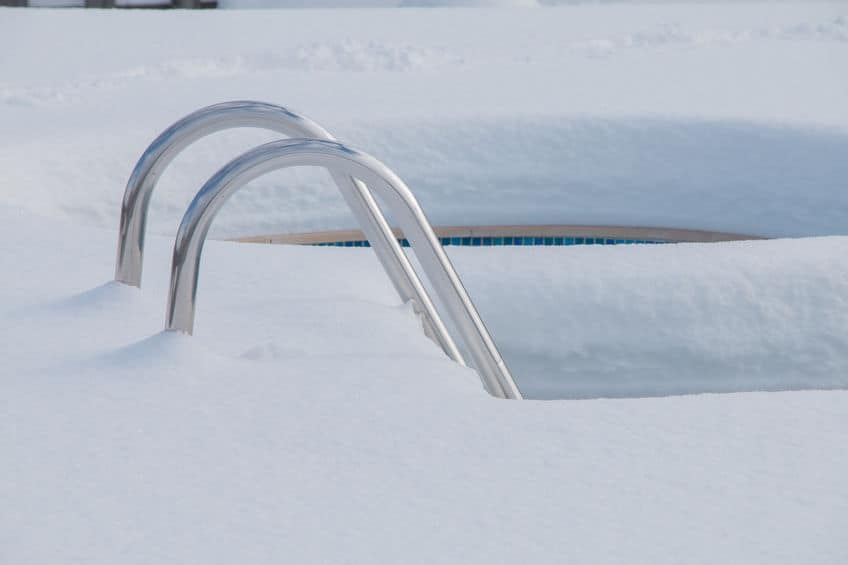Labor Day has come and gone, the kids are back at school and you’re probably getting ready to close your pool for the season. Winterizing a salt water pool and closing it for the year is slightly different than a chlorine or bromine pool that doesn’t have as much equipment.
Let’s focus on the important things to do and since the title of this post is how to winterize a salt water pool, I’m going to assume you do in fact live in an area that gets a real winter with freezing weather and possibly snow and ice and all the other awesomeness (sarcasm) that comes with this time of the year.
How To Winterize A Salt Water Pool
I’ve already written a detailed post called 10 Tips To Winterize A Swimming Pool that discusses important steps to take in general to close your pool for the winter. These include very important tips on dropping the water level, draining all pipes, capping the water jet returns, etc.
For this post, let’s concentrate on specific things related to a salt water pool that you should and shouldn’t do.
Don’t Add More Salt
At this point in the season as you’re ready to close the pool, some owners wonder if they need to add more salt. Unless your pool chemistry is off, the answer is no. You need to add salt at the beginning of the season when opening the pool, not when you are closing the pool.
Protect The Chlorinator System
We have a Hayward AquaRite system that comes in a metal container with latch and lock which keeps it tightly closed during the winter. Water can’t get in so it’s already pretty much taken care of. I always shut the fuse off to the chlorinator over the winter just to be safe and protect the plugs. One winter I noticed that an animal had been back there gnawing on the cord to the pool lights so I had to get that repaired.
Always Bring The Salt Cell Indoors For The Winter
In cold weather locales, always unscrew the salt cell and bring it indoors for the winter. I would never leave it out over the winter during freezing temperatures due to the damage it can do. It’s also a good time to inspect the cell to look for damage or build up on the titanium plates inside the cell.
Add Chlorine And Algaecide Before Closing
From personal experience, a salt water pool does need chemical chlorine from time to time and pool closing is one of those times. Super chlorinating the pool at the end of the season ensures that there is enough chlorine to continue keeping the water clear especially if the weather warms up in autumn if temperatures rise. Adding algaecide to the water at closing (also from experience) helps to prevent green algae from growing over the winter and taking over the pool, something else I experienced quite frequently before I figured out how to stop it.
Consider A Pool Winterizing Kit
Rather than figuring out how much chlorine or algaecide to add, you may consider a premade winterizing kit which typically contains a winterizing agent, stain guard, algaecide and perhaps other product(s). I found out the hard way the first few years that we had a pool that adding chemicals at closing time helps ensure the water is clear – or at least relatively clear – over the winter. This is much better than taking off the pool cover and seeing green pea soup-like water full of algae which is what I experienced the first few winters and believed to be normal.

Get A Good Quality Pool Cover
We have a green LOOP LOC cover as shown above. It completely covers the pool, keeps leaves and other debris out but also offers safety features to prevent a person or animal from falling in. It also allows snow to melt and drip into the pool slowly filling it up over the winter to minimize the amount of water you need to add in the spring during the pool opening.
While you can certainly get a tarp and stick it over your pool with some bricks to hold it in place, it doesn’t offer the same protection and may do more harm than good if the weight of the snow causes it to collapse and fall into the pool, bricks and all.
Conclusion
While there are many other steps to closing a pool that you can read about on my post on winterizing a pool, a salt water pool requires a few extra tasks given the extra parts of the salt system. In particular, I always take my salt cell indoors and never leave it out over the winter. While I add certain chemicals into the pool before closing that I refer to above, I don’t add salt in at closing as I’ve already added enough salt in earlier in the summer and simply ensure that other aspects of water chemistry like chlorine, pH etc are in order.

